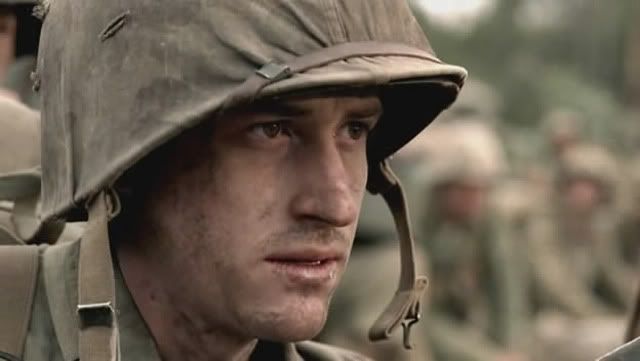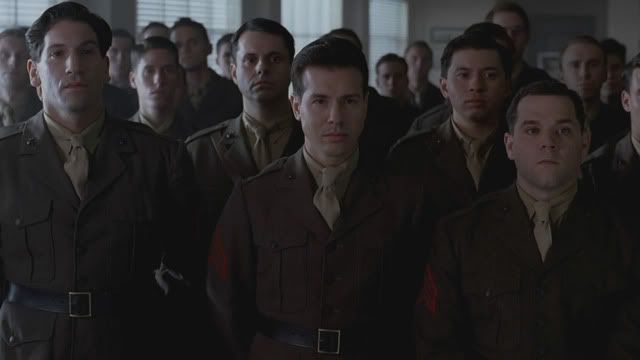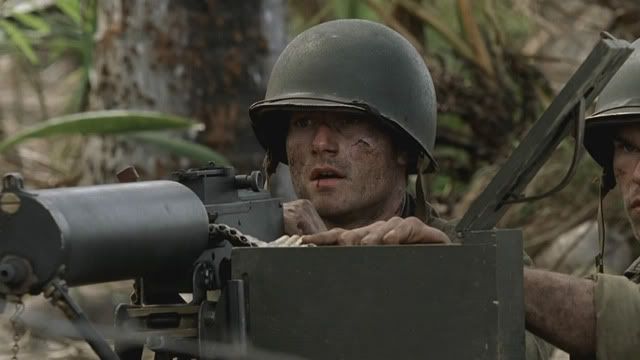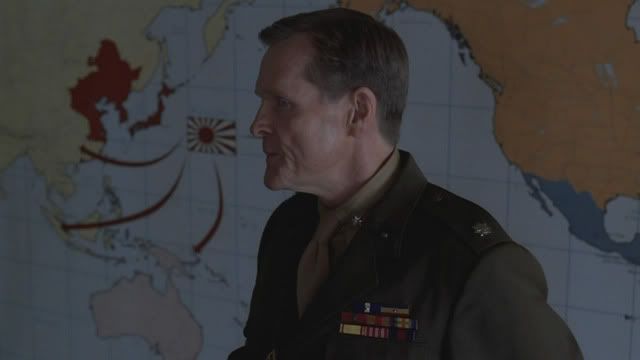
Whenever I tell someone that I'm currently watching "The Pacific", the first question I'm always asked is usually something like "So is 'The Pacific' as good as 'Band of Brothers'?". This is a deceptively easy question, and my usual answer has so far been a very simple "No." This is usually followed by a look of disappointment on the other person's face, as they begin to process what I've said and what that means. Generally it's taken to mean that "The Pacific" is not worth watching, but that's not what I mean at all.
When you get down to simple terms, the latest offering from the team that brought us the epic and sublime Band of Brothers doesn't quite measure up. That said, the bar was set so high by "Band of Brothers" that it would be difficult for any mini-series to meet or exceed those kinds of expectations. That said, The Pacific is worth watching, and does an excellent job in telling it's story. What must be understood is that "Band of Brothers" and "The Pacific" are not only different stories about different people, they're different kinds of stories altogether.

"Band of Brothers" was based on the book of the same name by Stephen Ambrose. The narrative mainly follows one character, and from there you get moments and sometimes entire episodes devoted other individuals. As characters are introduced, they fade out of the spotlight to let different characters get to the forefront, but stick around and continue to grow with the rest of the cast. This was a masterful method to provide development to literally an army of personalities, and by the end you care about each and every one of them. While the main character of the series never changes, you're still able to get to know the people around him by the end.
Conversely, "The Pacific" is based on the memoirs of three different Marines and their tours in the Pacific War. Robert Leckie's Helmet for My Pillow provides insight on the opening actions of the Marines at Guadalcanal to the bloody battle of Peleliu. With the Old Breed: At Peleliu and Okinawa and China Marine by Eugene Sledge both cover Peleliu, Okinawa, and the post-war actions of the 1st Marine Division. Finally Chuck Tatum's Red Blood, Black Sand illuminates the actions of war hero John Basilone on Iwo Jima. You can see that with this breadth of source material by different authors comes a disbursement of focus between three different characters. The mini-series has not one main character, but three in Leckie, Sledge, and Basilone.

The with the focus on the actions of these three Marines, the audience is treated to an in-depth look at their motivations, their reactions, and how the events that they take part in change these men. Unfortunately, the effects of war are somewhat universal, and we also get a repeating theme of the war breaking these Marines down both during their tour and after they return home. The audience is repeatedly reminded that war is awful and it can get a little heavy handed after you see different guys going through the same trauma over and over again. This is probably a testament to the brutality that coursed through the entire Pacific campaign.
Another consequence is that none of the supporting characters ever get a chance to shine through. There are a few that stick out, but many are left to stand around in the background or simply not make it to the end of the series. Again, this is most likely a reflection of the very real and extremely high causality rate in the front-line Marine units. While the "Band of Brothers" episode "The Breaking Point" had a very visceral and direct reminder of the losses suffered by Easy Company, no such moment exists for "The Pacific". Many characters are killed on screen, and the surviving characters talk of little else than their fallen comrades. There is a moment in the last episode where a character appears to suffer some Survivor's Guilt, but this is much more subtle than the end of "The Breaking Point" in "Band of Brothers", where the company's First Sergeant Carwood Lipton tallies the fallen Easy Company members in a church. Such a scene would also not have worked as well in "The Pacific", as the audience had very little time to know these lost supporting characters.

What all this means is that "The Pacific" is a different experience than "Band of Brothers". There is both a more direct focus on a smaller number of characters, and we get to know John Basilone, Robert Leckie, and Eugene Sledge very well. On the other hand, we do not get the rich cast of supporting characters that made up Easy Company. "The Pacific" still manages to serve up more than its share of action, drama, and personal struggles just like its predecessor, and that for me is enough to recommend it.


0 comments:
Post a Comment